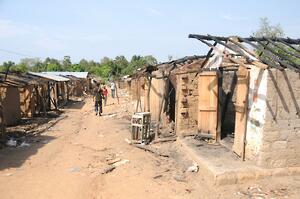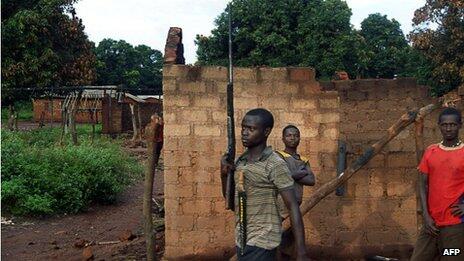One man describes how his four-year-old son's throat was slit, and how he saw a snake swallowing a baby. A woman explains that she is caring for a young girl because her mother went searching for medicine and was bludgeoned to death with Kalashnikov rifles. A young man tells how he was bound and thrown to the crocodiles, but managed to swim to safety.
 |
| Papa Romeo (not his real name), 35, whose four-year-old son was murdered in Bossangoa. Photograph: |
This is the world of horrors that the Central African Republic (CAR) has become. Thousands of people are dying at the hands of soldiers and militia gangs and from untreated diseases such as malaria. Boys and girls as young as eight are press ganged into fighting between Christians and Muslims. There are reports of beheadings and public execution-style killings. Villages are razed to the ground.
Never much more than a phantom state, the CAR has sucked in thousands of mercenaries from neighbouring countries and, France warned on Thursday, now stands "on the verge of genocide". Yet many would struggle to find the country on a map, despite the clue in its after thought name.
The humanitarian emergency in the CAR, a landmass bigger than France where the average male life expectancy is 48, remains a blind spot for most of the international community. Samantha Power, the US ambassador to the UN, noted recently that the situation in the CAR has been referred to as "the worst crisis most people have never heard of".
That is nothing new for a country that stands as one of the most profound indictments of European colonialism, a contrivance that since independence in 1960 has endured five coups, infrastructure run on a shoestring and a self- decalred empro whose lavish coronation was inspired by Napoleon.
Rich in gold, diamonds, timber and uranium, the CAR has proved irresistible to warlords such as Joseph Kony, the leader of a cult-like militia who the government claimed this week is finally negotiating surrender.
The latest eruption began in March when the unpopular president, François Bozizé, fled by helicopter with five suit cases after being overthrown by a loose coalition of rebels, bandits and guns for hire known as the Seleka, meaning "alliance" in the local language. One of its leaders, Michel Djotodia, declared himself president — the first Muslim to rule this majority Christian nation of 4.6 million people. What Médecins sans Frontières termed "a crisis on top of a crisis" for the population accelerated considerably in September when Djotodia officially disbanded the Seleka. Many of the rebels refused to disarm and leave the militias as ordered but veered further out of control, killing, looting and burning villages. They also systematically stripped administrative offices down to the light fittings and destroyed public records.
 |
| A Seleka fighter poses with his weapon at the former Bangui firefighters barracks, now a Seleka base |
The US estimates that nearly 400,000 people have been displaced – many hiding in the jungle without access to malaria or HIV treatment – and 68,000 have gone to neighbouring countries.
The Seleka are playing judge, jury and executioner without regard even for Djotodia. Last Saturday, when a prominent judge was assassinated by men on motor bikes in the ramshackle capital, Bangui, the Seleka rounded up three suspects and offered his family the chance to kill them; when the family refused, citing the judge's dedication to due process, the Seleka shot the suspects dead outside their front gate. The family still do not know if they were the real culprits.Two days later and 185 miles away in the town of Bossangoa, Jislain Ngangaguende was among five men accused of plotting against the Seleka who were tied up, beaten with guns and thrown off a bridge into a river with perils including crocodiles and hippos. "I started to drink water so I brought my head up, but a soldier saw me and tried to shoot me," recalls the 24-year-old, multiple sticking plasters on his head. "I stayed down for minutes and when I came up they were gone. I bit on a branch and moved up the river but my hands were still tied behind my back. I thought I was dead but the power of God made me get out."
 |
| Sonia Mackotoua, 37, with a photo of her cousin Modeste Martineau Bria, the judge killed by men on motorbikes in Bangui |
Fear of the Seleka's brutality can be seen in ghost villages that line a rutted dirt road running north of Bangui through a vast sprawl of lush green African bush. Mudbrick houses with thatched roofs stand empty beneath the trees, raising the question of where the residents have fled. The answer can be found in Bossangoa, where about 34,000 people have sought refuge at the St Antoine de Padoue Cathedral.
 |
| Zita Nganamodei with 18-month-old Arethas Demba, whose mother was bludgeoned to death after unknowingly crossing an arbitrary boundary while taking her daughter for medical treatment. |
Inside, the white-walled church remains immaculately clean. Two delicate chandeliers hang from a wood-beam ceiling and, beyond the rows of empty pews, flowers grace the altar and a fresco depicts the sun, a golden chalice and two angels against a blue sky. But the serenity mocks the monumental human tragedy manifesting itself outside the padlocked gate.
The Catholic mission compound is a melee of men, women and many children, their colourful T-shirts and dresses wearing a layer of grime, some carrying bowls of food or firewood on their heads, some even restarting their lives with barber shops, cooking pots, food stalls, sewing machines and livestock. Washing lines hang between row after row of blue and white tarpaulin tents marked Unicef. It is a sanctuary of sorts, with a constant hubbub of voices, but the cramped conditions leave women sleeping rough in corridors, children playing in the dirt, waste piling up and worries about an outbreak of cholera.
Everyone here has a sad story to tell. Zita Nganamodei, 26, has a baby girl tied to her back who is not her own. Yesterday, she says, her neighbour, Josephine Kolefei, brought the baby for medical treatment without realising she was crossing an arbitrary boundary that the Seleka had just imposed. The 35-year-old was beaten with a Kalashnikov and taken to hospital, where she died. "I went to site and found the baby on the ground," says Nganamodei, who has two children of her own. "I brought her to the hospital to be treated."
She says she will now take care of the girl, 18-month-old Arethas Demba, but will one day have to explain how her mother died. "I do not know why they had to kill her. I ask that justice be done for this killing. I don't know what will happen in the future if these killings continue."
Meanwhile a 35-year-old first aid worker who wants to be known as Papa Romeo claims that, on 8 November in the village of Bombi Te, the Seleka were outrun by motorcyclists carrying weapons and took revenge on the population. "My wife was in the field with our four-year-old, Richide," he says. "The Seleka took her money and gold and told her to leave and not come back.
"They started to attack my son. They tried to shoot him but the gun was not working. So they slit his throat instead. What threat does this child pose to the Seleka? He is just a child. My heart is right here: if Michel Djotodia was here, my heart would destroy him."
More than 30 people have been killed in the village of around 5,000, situated near a gold mine about 30 miles from Bossangoa, Romeo estimates. "I went to the field where my wife was and found a boa constrictor eating a baby because its mother had been killed. Then I saw a woman shot in the leg with a child whose intestines were falling out."
What started as a political movement against the corrupt and autocratic Bozizé is now taking on an ominously religious character. Nearly all the Seleka are Muslim, including mercenaries from neighbouring Chad and the notorious Janjaweed from Sudan's Darfur region. An "us and them" mentality of mutual distrust and paranoia is taking root, with some Christians taking up arms in vigilante militias known as "anti-balaka" — meaning anti-sword or anti-machete — and committing atrocities of their own, giving the Seleka a pretext for yet more aggression. The spiral of violence has become a recruiting sergeant for thousands of child soldiers.
Everyone at the Catholic mission in Bossangoa is Christian; internally displaced Muslims are gathered in a part of town including about 450 at a school, where wood desks and benches lie abandoned under trees and the blackboards are frozen at 2 August 2013. It is a stark physical separation. Romeo adds: "We have never seen religions tensions like this in the CAR before. The CAR is not a Muslim country; it is a Christian country. We have never seen so many Muslims in the country before. They have come from other countries." Like many in the CAR, he feels it is being ignored and abandoned to its fate. "International leaders should open their eyes to what is going on. Children are sleeping on the floor like goats. Is it because we have black skin?"
The Seleka are also torturing suspected enemies, according to a 47-year-old who gives his name only as Laurent. When they accused him of trying to pass on fake money, he claims, they jailed him and tortured two of his adult sons with a pepper paste rubbed into the armpits and legs to create a burning sensation. "They put it in the ears and nose of one of my sons and forced him to inhale it, then hit him so he almost asphyxiated. He was bleeding from his ears and mouth. I asked them to kill me and let my children go."
Eventually they were released. The son, 24, spent two days in hospital and still has breathing difficulties. Laurent, who has 12 children in all, adds: "The Seleka are criminals. In the beginning, the relations between Christians and Muslims were good here but the Muslims followed the Seleka and now things have changed."
The Catholic mission is presided over by Father Frédéric Tonfio, struggling to cope with the influx and working with a local imam to keep the peace across the sectarian divide. "The Christians feel betrayed by the Muslims and are starting to feel vengeances in their hearts," he warns. "This is a very big challenge for the church."
Tonfio is pleading for global intervention before it is too late. "I have only been able to count on my colleagues in the church. The silence of the international community is like they are accomplices allowing this to happen. It's almost as if the Sekela is stronger than the international community. Everyone knows what is going on here. Every day that we delay, more people die."
The local Seleka commanders, officially now part of the national army, deny responsibility for what Amnesty International has called human rights violations on an "unprecedented scale" and claim Tonfio is being obstructive. A Chadian colonel named Saleh says: "He says one thing and does something else. We said to everyone at the church they can return to their homes but they refused. Civilians need to return home because we will take care of their security.
"We don't say this is Christian or this is Muslim. We work for everybody. Even if someone who's Muslim is wrong, we will put him on the right path."
The atmosphere remains tense and unpredictable here and in other towns. Bouca, to the east, has been destroyed in heavy fighting in recent days, with around 3,000 people- more than half of them children - again seeking sanctuary at the Catholic mission there. Lewis Mudge, a Human Rights Watch researcher, says he witnessed a Seleka colonel telling them: " If there are people here tomorow at eight o'clock in the morning, we will shoot and burn the mission. If you are still here, you will see what we do."
The arrival of African regional peacekeepers neutralised that threat for the time being, but their 2,500-strong force is still too small and ill-equipped to carry out its mandate of protecting civilians. French armoured vehicles could also be seen patrolling north of Bangui again this week but their contingent of 400 troops can do little more than protect the airport and other assets. The UN secretary council meets on Monday to discuss a possible peace keeping mission.
Headline-grabbing claims of mass rapes or infiltration by Islamist militant groups such as Boko Haram from Nigeria or al-Shabaab from Somalia are currently unfounded, according to Mudge and humanitarian sources working in the area. One said of the Seleka: "These guys are not Islamic fundamentalists. They are Muslim-lite. They are here for prosperity and power; they are not here to change anyone's confession."
Nor, says Mudge, should this be called a genocide – yet. It is too chaotic for that, meaning that the international community still has time to prevent another Rwanda. Six thousand peacekeepers would be a start, Mudge says. "The world needs to find the CAR on the map and start paying attention on humanitarian grounds. It's still early enough to avert a crisis in this country. It's not a genocide and it's not a civil war but it's certainly trending in that direction."



